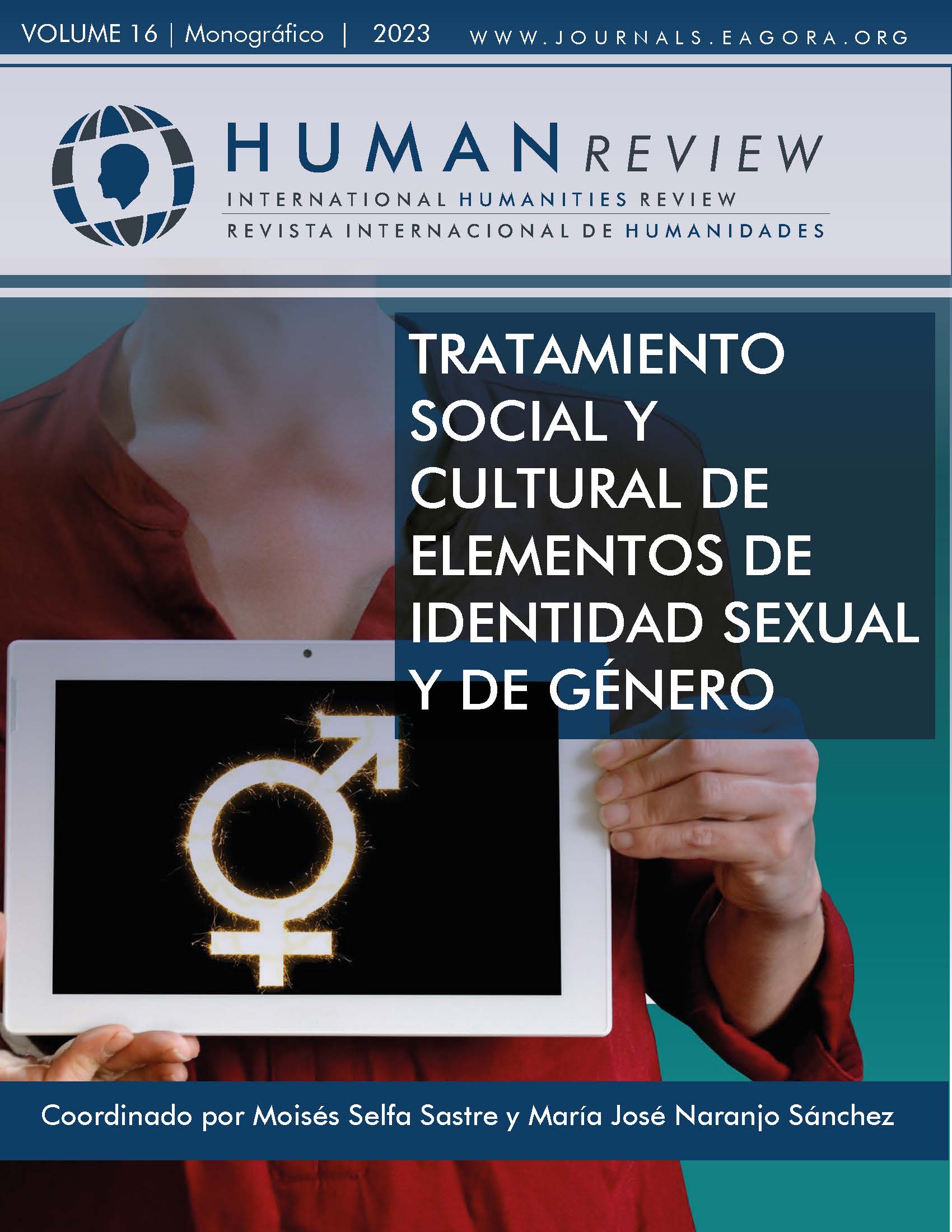Challenging normativity: experiences in queerifying the classroom
DOI:
https://doi.org/10.37467/revhuman.v12.4708Palavras-chave:
LGTBIQ , Teaching, Gender, Ethnicity, Masculinities, Privilege, Normativity, LGTBIQ Enseñanza, Género, Etnicidad, Masculinidades, Privilegio, NormatividadResumo
As English Studies researchers and teachers, our experience has shown that there continues to exist an urgent need to incorporate gender as a reading tool of literary texts to foster a non-discriminatory and equality perspective. Given the many advances in gender equality that have been achieved as well as the rising backlash against such progressive moves that spread through Europe, our proposal is based on the “queerification of the classroom”, a notion defined as a transgressive initiative that effectively and systematically incorporates the deconstruction of normativity and fosters resistance to socially constructed assumptions about normativity and deviance.
Referências
Armengol, J. M. (2012). In the dark room: Homosexuality and/as blackness in James Baldwin’s Giovanni’s Room. Signs: Journal of Women in Culture and Society, 37(3), 671-693. https://doi.org/10.1086/662699
Baldwin, J. (1952). Go tell it on the mountain. Vintage International.
Baldwin, J. (1956). Giovanni’s room. Delta Trade Paperbacks.
Baldwin, J. (1954). The Male Prison. In The price of the ticket: Collected nonfiction: 1948-1985 (pp. 111-115). Beacon Press.
Baldwin, J. (1963). A Talk to Teachers. In The price of the ticket: Collected nonfiction: 1948-1985 (pp. 330-337). Beacon Press.
Baldwin, J. (1985). Here Be Dragons. In The price of the ticket: Collected nonfiction: 1948-1985 (pp. 685-698). Beacon Press.
Crenshaw, K. (1991). Mapping the margins: intersectionality, identity politics, and violence against women of color. Standford Law Review, 43(6), 1241-1299.
Donoso, T., & Velasco, A. (2013). ¿Por qué una propuesta de formación en perspectiva de género en el ámbito universitario? Profesorado. Revista de currículum y formación de profesorado, 17(1), 71-88.
European Commission (2017, November 2). A Europe of equals: European Commission stands up for women’s rights in turbulent times. [Press release] https://ec.europa.eu/commission/presscorner/detail/en/ip_17_4711
European Commission (2019). Gender Equality Strategy: Achievements and Key Areas for Action. https://ec.europa.eu/info/policies/justice-and-fundamental-rights/gender-equality/
Faludi, S. (2006). Backlash: the undeclared war against American women. Three Rivers Press.
Flood, M., Dragiewicz, M., & Pease, B. (2018). Resistance and backlash to gender equality: an evidence review. Brisbane: Crime and Justice Research Centre. Queensland University of Technology.
Floyd, K., & Horlacher, S. (2017). Contemporary masculinities in the UK and the us: between bodies and systems. Palgrave Macmillan.
Gallego, M. (2014). Progressive masculinities: Envisioning alternative models for black manhood in Toni Morrison’s novels. In Carabí A. & J. Armengol (Eds.), Alternative Masculinities for a Changing World (pp. 161-173). Palgrave Macmillan.
Haraway, D. (1988). Situated knowledges: The science question in feminism and the privilege of partial perspective. Feminist Studies, 14(3), 575-99.
Harding, S. (1996). Ciencia y feminismo. Morata.
hooks, B. (1989). Talking back: Thinking feminist, thinking black. South End Press.
hooks, B. (1994). Teaching to transgress: Education as the practice of freedom. Routledge.
Karlin, M. (2013, November 22). The rage of the angry white male continues its battle against equality. Truthout. https://truthout.org/articles/
Kimmel, M. (2017). Angry white men. American masculinity at the end of an era. Bold Type Books.
Kopleson, K. (2002). Dis/integrating the gay/queer binary: ¨reconstructed identity politics¨ for a performative pedagogy. College English, Illinois, 65(1), 17-34.
Luhmann, S. (1998). Queering/querying pedagogy? Or pedagogy is a pretty queer thing. PINAR, William F. Queer theory in Education. Lawrence Erlbaum, pp. 120-132.
Mellström, U. (2017). A restoration of classic patriarchy? NORMA: International Journal for Masculinity Studies, 12(1), 1-14.Morrison, T. (1977). Song of Solomon. Vintage.
Morrison, T. (1983). Recitatif. Chatto & Windus.
Morrison. T. (1987). Beloved. Vintage.
Morrison, T. (2012). Home. Vintage.Morrison, T. (2019). The source of self-regard: selected essays, speeches, and meditations. Alfred A. Knopf.
Pease, B. (2013). Undoing privilege: unearned advantage in a divided world. Zed Books.Requena-Pelegrí, T. (2021). The aging male body as a contested site of privilege: Literary representations in Jane Smiley’s A Thousand acres and Elizabeth Strout’s Olive Kitteridge. In J. M. Armengol, Ed., Aging masculinities in Contemporary U.S. fiction. Palgrave Macmillan.
Requena-Pelegrí, T., & López, G. (in press). Destabilizing male privilege: Explorations of the posthuman in Mary Shelley’s Frankenstein (1818) and Jeannette Winterson’s Frankisstein (2019). In U. Mellström & B. Pease (Eds.), Posthumanism and the man question: Beyond anthropocentric masculinities. Routledge.
Trujillo, G. (2015). Pensar desde otro lugar, pensar lo impensable: hacia una pedagogía queer. Educação e Pesquisa, 41. https://doi.org/10.1590/S1517-9702201508142550.
Trujillo, G. (2022). El feminismo queer es para todo el mundo. Catarata.
Xarxa Vives (2021). La perspectiva de gènere en docència a les universitats de la Xarxa Vives. Situació actual i reptes futurs. Col·lecció Política Universitària, 13.
Downloads
Publicado
Como Citar
Edição
Seção
Licença
Os autores/as que publicam nesta revista concordam com os seguintes termos:
- Os autores/as terão os direitos morais do trabalho e cederão para a revista os direitos comerciais.
- Um ano após a sua publicação, a versão do editor estará em acesso aberto no site da editora, mas a revista manterá o copyright da obra.
- No caso dos autores desejarem asignar uma licença aberta Creative Commons (CC), poderão a solicitar escrevendo a publishing@eagora.org.









